Service Operations Management: Uber's Issues and Solutions Analysis
VerifiedAdded on 2020/03/04
|7
|1564
|350
Report
AI Summary
This report delves into the service operations management challenges faced by Uber, examining the lawsuit against its CEO, Travis Kalanick, for fraud and breach of fiduciary duty. It explores questionable management styles, including allegations of a toxic workplace environment, and analyzes the implications of these problems on customer expectations, organizational performance, and shareholder value. The report also discusses the legal actions and protests Uber has faced globally. Furthermore, it outlines strategies to avoid similar issues, emphasizing the importance of adhering to operations management principles, conducting audits, fostering humility among executives, establishing anonymous reporting mechanisms, embracing change, and applying the causality principle to address problems promptly. The report concludes by highlighting the significance of stable management and employee performance for long-term success.
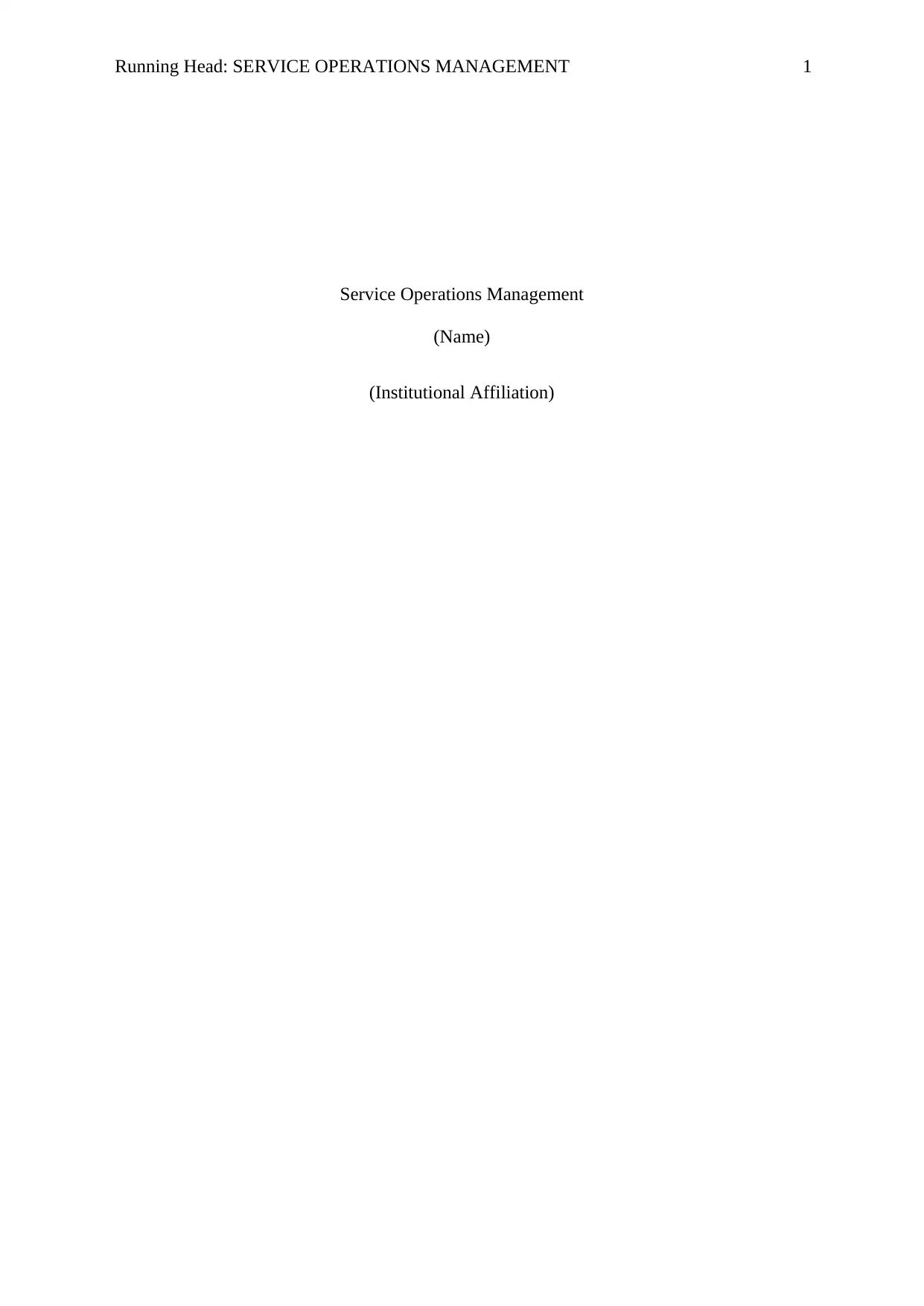
Running Head: SERVICE OPERATIONS MANAGEMENT 1
Service Operations Management
(Name)
(Institutional Affiliation)
Service Operations Management
(Name)
(Institutional Affiliation)
Paraphrase This Document
Need a fresh take? Get an instant paraphrase of this document with our AI Paraphraser
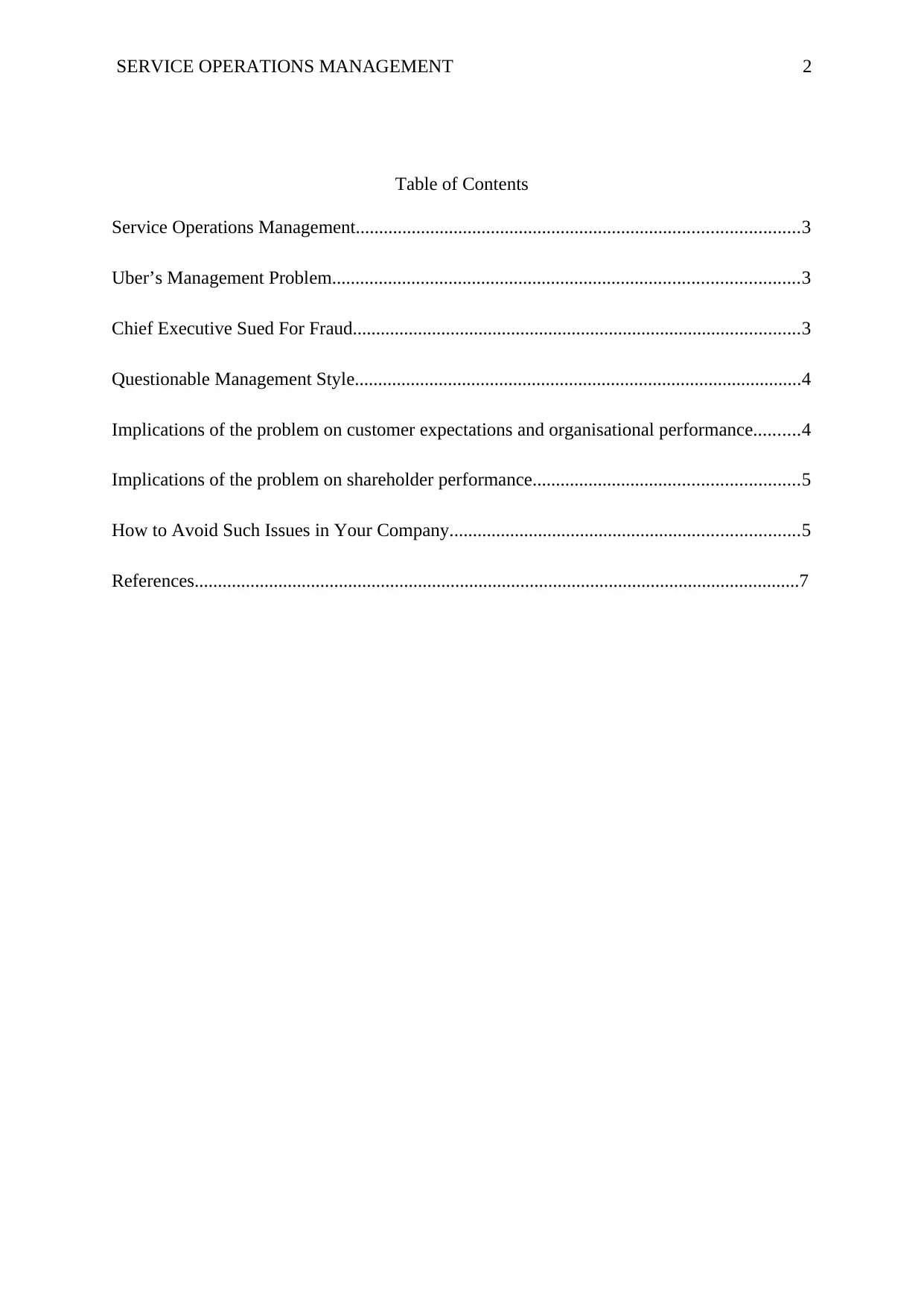
SERVICE OPERATIONS MANAGEMENT 2
Table of Contents
Service Operations Management...............................................................................................3
Uber’s Management Problem....................................................................................................3
Chief Executive Sued For Fraud................................................................................................3
Questionable Management Style................................................................................................4
Implications of the problem on customer expectations and organisational performance..........4
Implications of the problem on shareholder performance.........................................................5
How to Avoid Such Issues in Your Company...........................................................................5
References..................................................................................................................................7
Table of Contents
Service Operations Management...............................................................................................3
Uber’s Management Problem....................................................................................................3
Chief Executive Sued For Fraud................................................................................................3
Questionable Management Style................................................................................................4
Implications of the problem on customer expectations and organisational performance..........4
Implications of the problem on shareholder performance.........................................................5
How to Avoid Such Issues in Your Company...........................................................................5
References..................................................................................................................................7
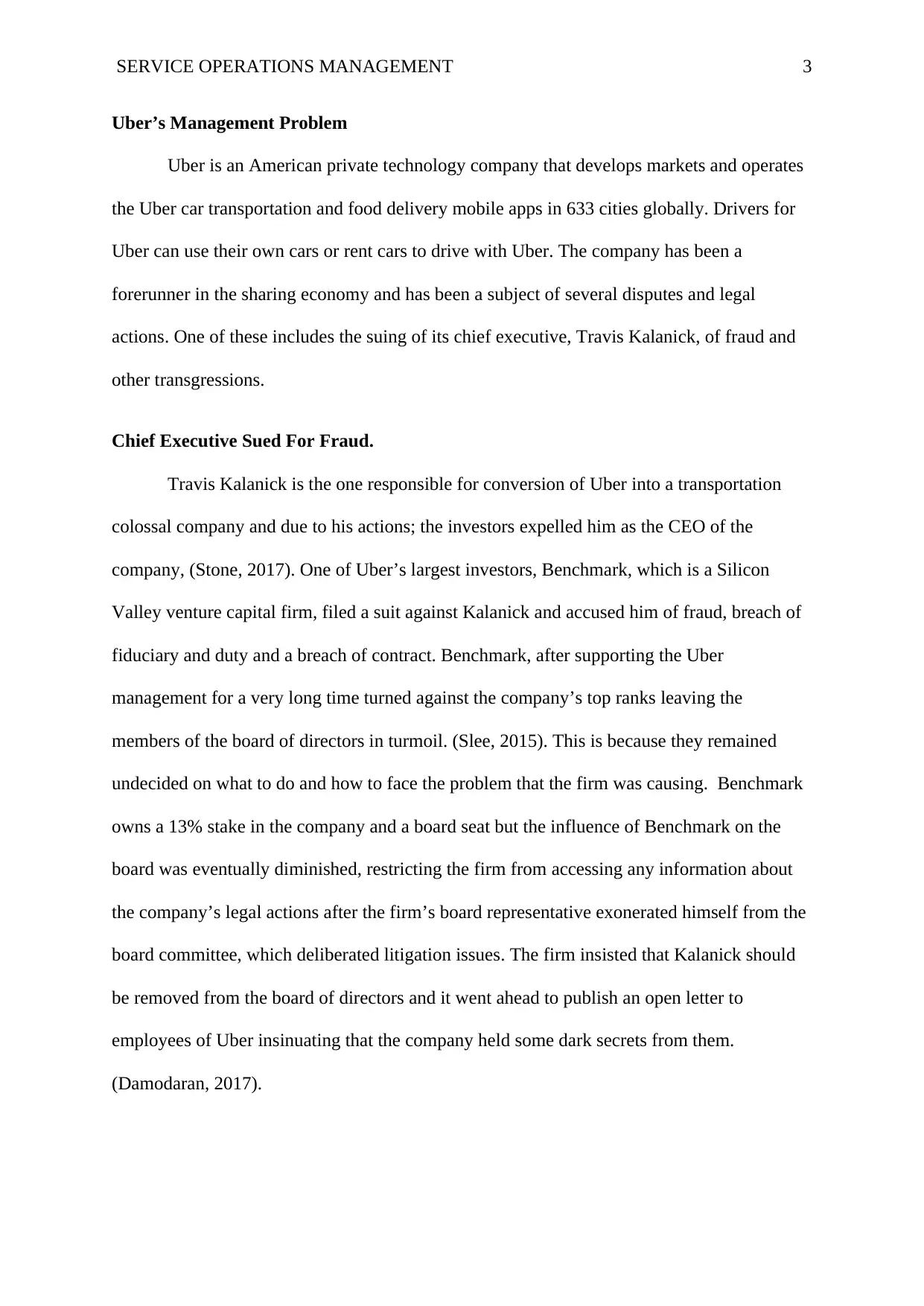
SERVICE OPERATIONS MANAGEMENT 3
Uber’s Management Problem
Uber is an American private technology company that develops markets and operates
the Uber car transportation and food delivery mobile apps in 633 cities globally. Drivers for
Uber can use their own cars or rent cars to drive with Uber. The company has been a
forerunner in the sharing economy and has been a subject of several disputes and legal
actions. One of these includes the suing of its chief executive, Travis Kalanick, of fraud and
other transgressions.
Chief Executive Sued For Fraud.
Travis Kalanick is the one responsible for conversion of Uber into a transportation
colossal company and due to his actions; the investors expelled him as the CEO of the
company, (Stone, 2017). One of Uber’s largest investors, Benchmark, which is a Silicon
Valley venture capital firm, filed a suit against Kalanick and accused him of fraud, breach of
fiduciary and duty and a breach of contract. Benchmark, after supporting the Uber
management for a very long time turned against the company’s top ranks leaving the
members of the board of directors in turmoil. (Slee, 2015). This is because they remained
undecided on what to do and how to face the problem that the firm was causing. Benchmark
owns a 13% stake in the company and a board seat but the influence of Benchmark on the
board was eventually diminished, restricting the firm from accessing any information about
the company’s legal actions after the firm’s board representative exonerated himself from the
board committee, which deliberated litigation issues. The firm insisted that Kalanick should
be removed from the board of directors and it went ahead to publish an open letter to
employees of Uber insinuating that the company held some dark secrets from them.
(Damodaran, 2017).
Uber’s Management Problem
Uber is an American private technology company that develops markets and operates
the Uber car transportation and food delivery mobile apps in 633 cities globally. Drivers for
Uber can use their own cars or rent cars to drive with Uber. The company has been a
forerunner in the sharing economy and has been a subject of several disputes and legal
actions. One of these includes the suing of its chief executive, Travis Kalanick, of fraud and
other transgressions.
Chief Executive Sued For Fraud.
Travis Kalanick is the one responsible for conversion of Uber into a transportation
colossal company and due to his actions; the investors expelled him as the CEO of the
company, (Stone, 2017). One of Uber’s largest investors, Benchmark, which is a Silicon
Valley venture capital firm, filed a suit against Kalanick and accused him of fraud, breach of
fiduciary and duty and a breach of contract. Benchmark, after supporting the Uber
management for a very long time turned against the company’s top ranks leaving the
members of the board of directors in turmoil. (Slee, 2015). This is because they remained
undecided on what to do and how to face the problem that the firm was causing. Benchmark
owns a 13% stake in the company and a board seat but the influence of Benchmark on the
board was eventually diminished, restricting the firm from accessing any information about
the company’s legal actions after the firm’s board representative exonerated himself from the
board committee, which deliberated litigation issues. The firm insisted that Kalanick should
be removed from the board of directors and it went ahead to publish an open letter to
employees of Uber insinuating that the company held some dark secrets from them.
(Damodaran, 2017).
⊘ This is a preview!⊘
Do you want full access?
Subscribe today to unlock all pages.

Trusted by 1+ million students worldwide
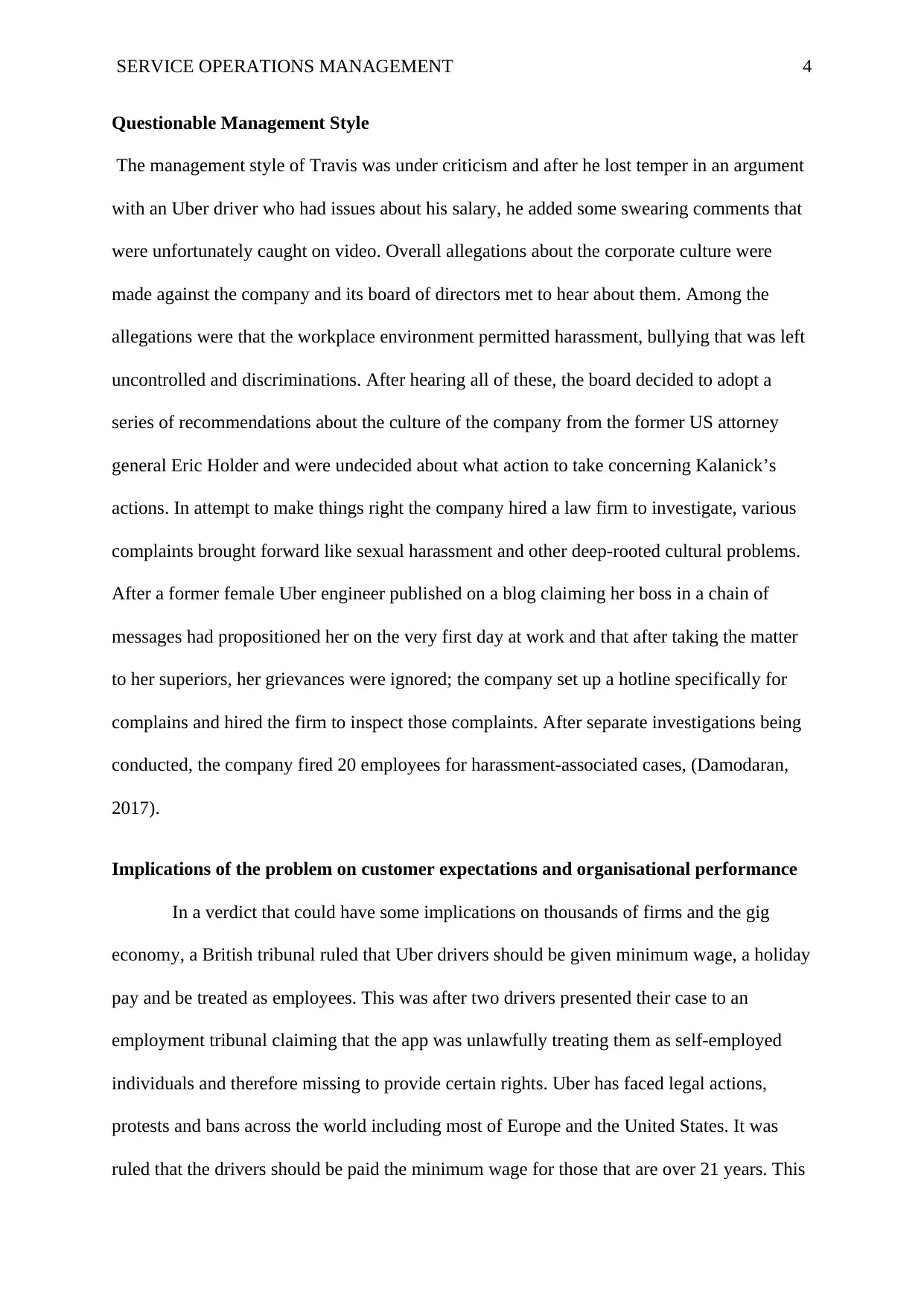
SERVICE OPERATIONS MANAGEMENT 4
Questionable Management Style
The management style of Travis was under criticism and after he lost temper in an argument
with an Uber driver who had issues about his salary, he added some swearing comments that
were unfortunately caught on video. Overall allegations about the corporate culture were
made against the company and its board of directors met to hear about them. Among the
allegations were that the workplace environment permitted harassment, bullying that was left
uncontrolled and discriminations. After hearing all of these, the board decided to adopt a
series of recommendations about the culture of the company from the former US attorney
general Eric Holder and were undecided about what action to take concerning Kalanick’s
actions. In attempt to make things right the company hired a law firm to investigate, various
complaints brought forward like sexual harassment and other deep-rooted cultural problems.
After a former female Uber engineer published on a blog claiming her boss in a chain of
messages had propositioned her on the very first day at work and that after taking the matter
to her superiors, her grievances were ignored; the company set up a hotline specifically for
complains and hired the firm to inspect those complaints. After separate investigations being
conducted, the company fired 20 employees for harassment-associated cases, (Damodaran,
2017).
Implications of the problem on customer expectations and organisational performance
In a verdict that could have some implications on thousands of firms and the gig
economy, a British tribunal ruled that Uber drivers should be given minimum wage, a holiday
pay and be treated as employees. This was after two drivers presented their case to an
employment tribunal claiming that the app was unlawfully treating them as self-employed
individuals and therefore missing to provide certain rights. Uber has faced legal actions,
protests and bans across the world including most of Europe and the United States. It was
ruled that the drivers should be paid the minimum wage for those that are over 21 years. This
Questionable Management Style
The management style of Travis was under criticism and after he lost temper in an argument
with an Uber driver who had issues about his salary, he added some swearing comments that
were unfortunately caught on video. Overall allegations about the corporate culture were
made against the company and its board of directors met to hear about them. Among the
allegations were that the workplace environment permitted harassment, bullying that was left
uncontrolled and discriminations. After hearing all of these, the board decided to adopt a
series of recommendations about the culture of the company from the former US attorney
general Eric Holder and were undecided about what action to take concerning Kalanick’s
actions. In attempt to make things right the company hired a law firm to investigate, various
complaints brought forward like sexual harassment and other deep-rooted cultural problems.
After a former female Uber engineer published on a blog claiming her boss in a chain of
messages had propositioned her on the very first day at work and that after taking the matter
to her superiors, her grievances were ignored; the company set up a hotline specifically for
complains and hired the firm to inspect those complaints. After separate investigations being
conducted, the company fired 20 employees for harassment-associated cases, (Damodaran,
2017).
Implications of the problem on customer expectations and organisational performance
In a verdict that could have some implications on thousands of firms and the gig
economy, a British tribunal ruled that Uber drivers should be given minimum wage, a holiday
pay and be treated as employees. This was after two drivers presented their case to an
employment tribunal claiming that the app was unlawfully treating them as self-employed
individuals and therefore missing to provide certain rights. Uber has faced legal actions,
protests and bans across the world including most of Europe and the United States. It was
ruled that the drivers should be paid the minimum wage for those that are over 21 years. This
Paraphrase This Document
Need a fresh take? Get an instant paraphrase of this document with our AI Paraphraser
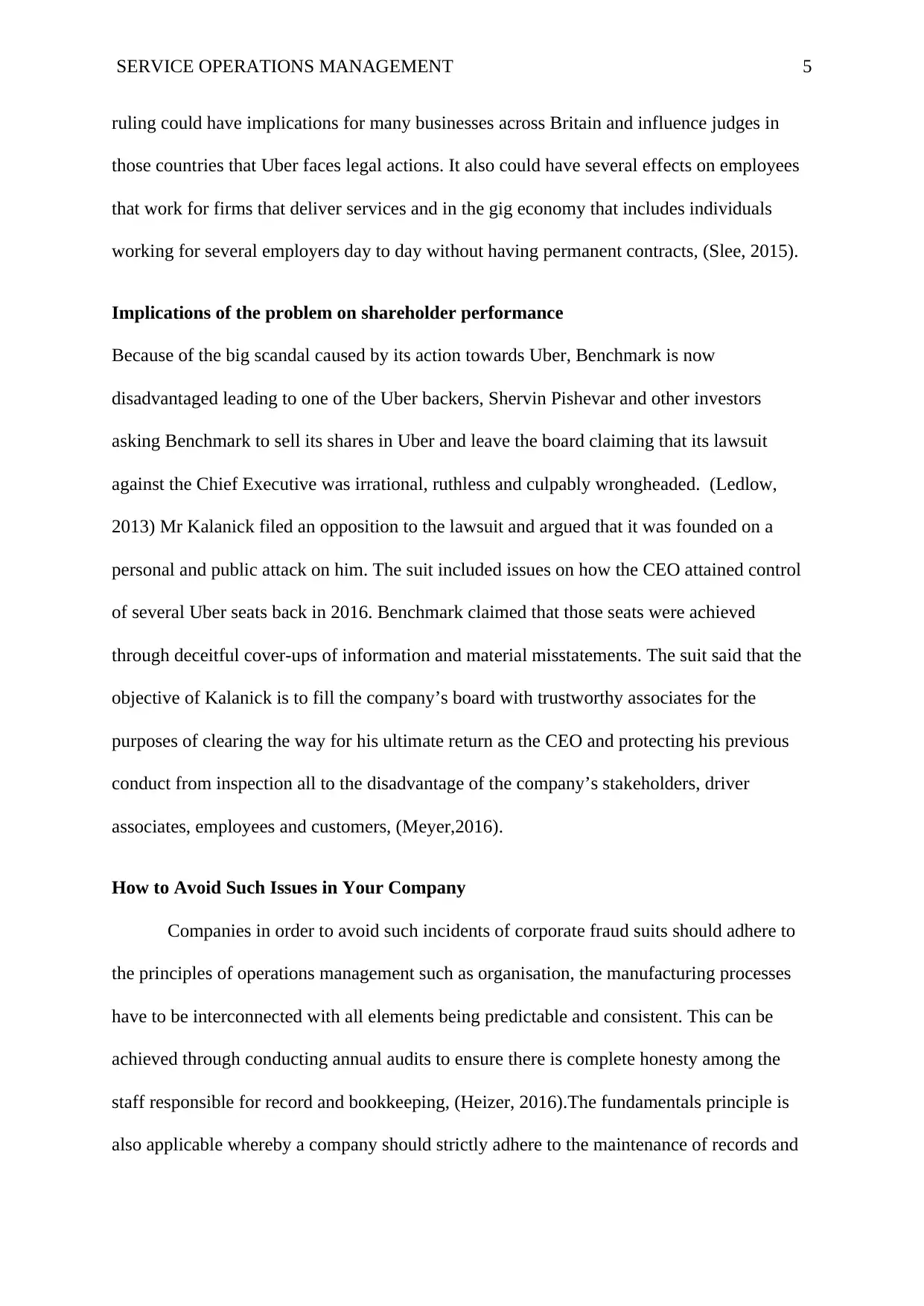
SERVICE OPERATIONS MANAGEMENT 5
ruling could have implications for many businesses across Britain and influence judges in
those countries that Uber faces legal actions. It also could have several effects on employees
that work for firms that deliver services and in the gig economy that includes individuals
working for several employers day to day without having permanent contracts, (Slee, 2015).
Implications of the problem on shareholder performance
Because of the big scandal caused by its action towards Uber, Benchmark is now
disadvantaged leading to one of the Uber backers, Shervin Pishevar and other investors
asking Benchmark to sell its shares in Uber and leave the board claiming that its lawsuit
against the Chief Executive was irrational, ruthless and culpably wrongheaded. (Ledlow,
2013) Mr Kalanick filed an opposition to the lawsuit and argued that it was founded on a
personal and public attack on him. The suit included issues on how the CEO attained control
of several Uber seats back in 2016. Benchmark claimed that those seats were achieved
through deceitful cover-ups of information and material misstatements. The suit said that the
objective of Kalanick is to fill the company’s board with trustworthy associates for the
purposes of clearing the way for his ultimate return as the CEO and protecting his previous
conduct from inspection all to the disadvantage of the company’s stakeholders, driver
associates, employees and customers, (Meyer,2016).
How to Avoid Such Issues in Your Company
Companies in order to avoid such incidents of corporate fraud suits should adhere to
the principles of operations management such as organisation, the manufacturing processes
have to be interconnected with all elements being predictable and consistent. This can be
achieved through conducting annual audits to ensure there is complete honesty among the
staff responsible for record and bookkeeping, (Heizer, 2016).The fundamentals principle is
also applicable whereby a company should strictly adhere to the maintenance of records and
ruling could have implications for many businesses across Britain and influence judges in
those countries that Uber faces legal actions. It also could have several effects on employees
that work for firms that deliver services and in the gig economy that includes individuals
working for several employers day to day without having permanent contracts, (Slee, 2015).
Implications of the problem on shareholder performance
Because of the big scandal caused by its action towards Uber, Benchmark is now
disadvantaged leading to one of the Uber backers, Shervin Pishevar and other investors
asking Benchmark to sell its shares in Uber and leave the board claiming that its lawsuit
against the Chief Executive was irrational, ruthless and culpably wrongheaded. (Ledlow,
2013) Mr Kalanick filed an opposition to the lawsuit and argued that it was founded on a
personal and public attack on him. The suit included issues on how the CEO attained control
of several Uber seats back in 2016. Benchmark claimed that those seats were achieved
through deceitful cover-ups of information and material misstatements. The suit said that the
objective of Kalanick is to fill the company’s board with trustworthy associates for the
purposes of clearing the way for his ultimate return as the CEO and protecting his previous
conduct from inspection all to the disadvantage of the company’s stakeholders, driver
associates, employees and customers, (Meyer,2016).
How to Avoid Such Issues in Your Company
Companies in order to avoid such incidents of corporate fraud suits should adhere to
the principles of operations management such as organisation, the manufacturing processes
have to be interconnected with all elements being predictable and consistent. This can be
achieved through conducting annual audits to ensure there is complete honesty among the
staff responsible for record and bookkeeping, (Heizer, 2016).The fundamentals principle is
also applicable whereby a company should strictly adhere to the maintenance of records and
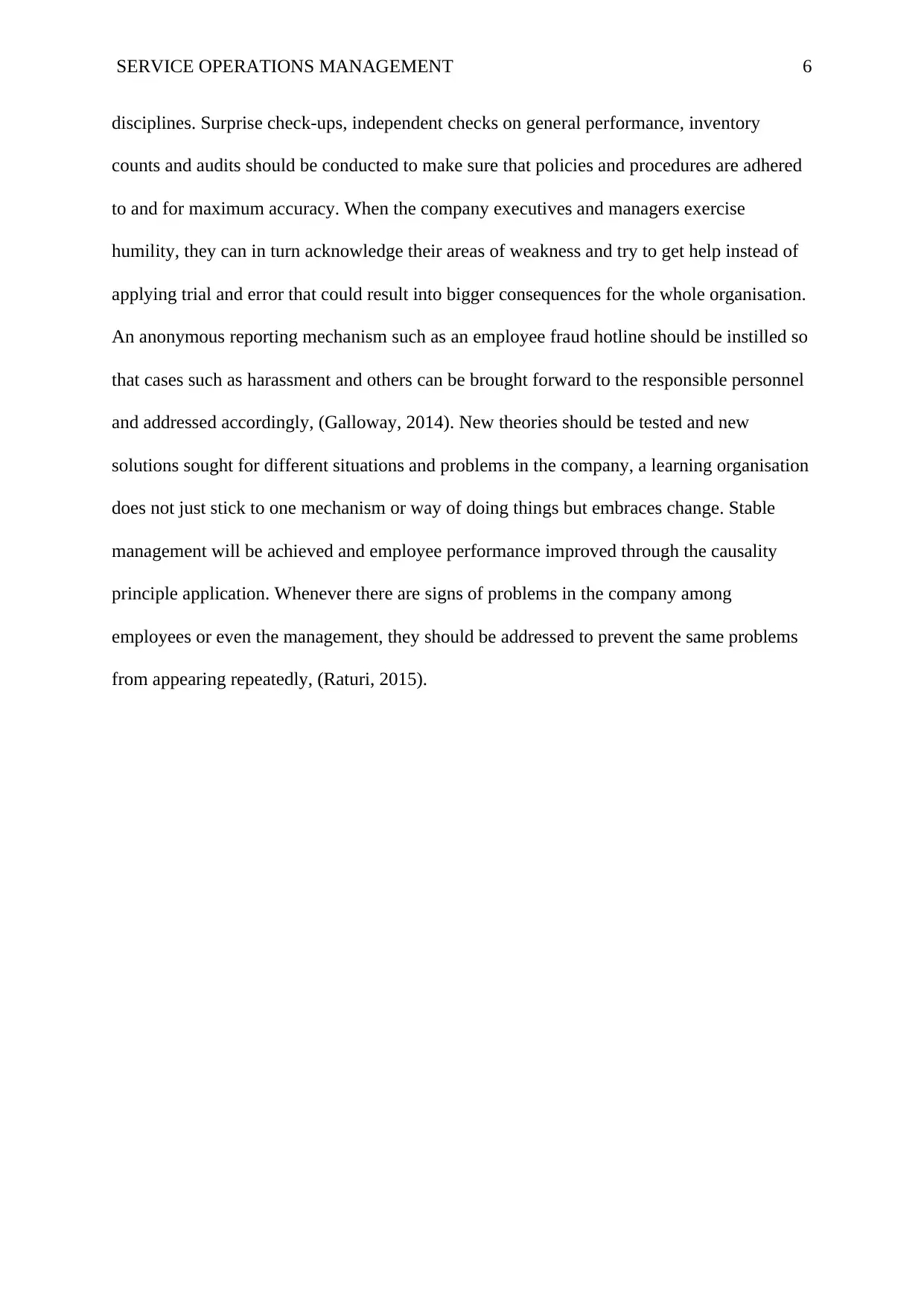
SERVICE OPERATIONS MANAGEMENT 6
disciplines. Surprise check-ups, independent checks on general performance, inventory
counts and audits should be conducted to make sure that policies and procedures are adhered
to and for maximum accuracy. When the company executives and managers exercise
humility, they can in turn acknowledge their areas of weakness and try to get help instead of
applying trial and error that could result into bigger consequences for the whole organisation.
An anonymous reporting mechanism such as an employee fraud hotline should be instilled so
that cases such as harassment and others can be brought forward to the responsible personnel
and addressed accordingly, (Galloway, 2014). New theories should be tested and new
solutions sought for different situations and problems in the company, a learning organisation
does not just stick to one mechanism or way of doing things but embraces change. Stable
management will be achieved and employee performance improved through the causality
principle application. Whenever there are signs of problems in the company among
employees or even the management, they should be addressed to prevent the same problems
from appearing repeatedly, (Raturi, 2015).
disciplines. Surprise check-ups, independent checks on general performance, inventory
counts and audits should be conducted to make sure that policies and procedures are adhered
to and for maximum accuracy. When the company executives and managers exercise
humility, they can in turn acknowledge their areas of weakness and try to get help instead of
applying trial and error that could result into bigger consequences for the whole organisation.
An anonymous reporting mechanism such as an employee fraud hotline should be instilled so
that cases such as harassment and others can be brought forward to the responsible personnel
and addressed accordingly, (Galloway, 2014). New theories should be tested and new
solutions sought for different situations and problems in the company, a learning organisation
does not just stick to one mechanism or way of doing things but embraces change. Stable
management will be achieved and employee performance improved through the causality
principle application. Whenever there are signs of problems in the company among
employees or even the management, they should be addressed to prevent the same problems
from appearing repeatedly, (Raturi, 2015).
⊘ This is a preview!⊘
Do you want full access?
Subscribe today to unlock all pages.

Trusted by 1+ million students worldwide
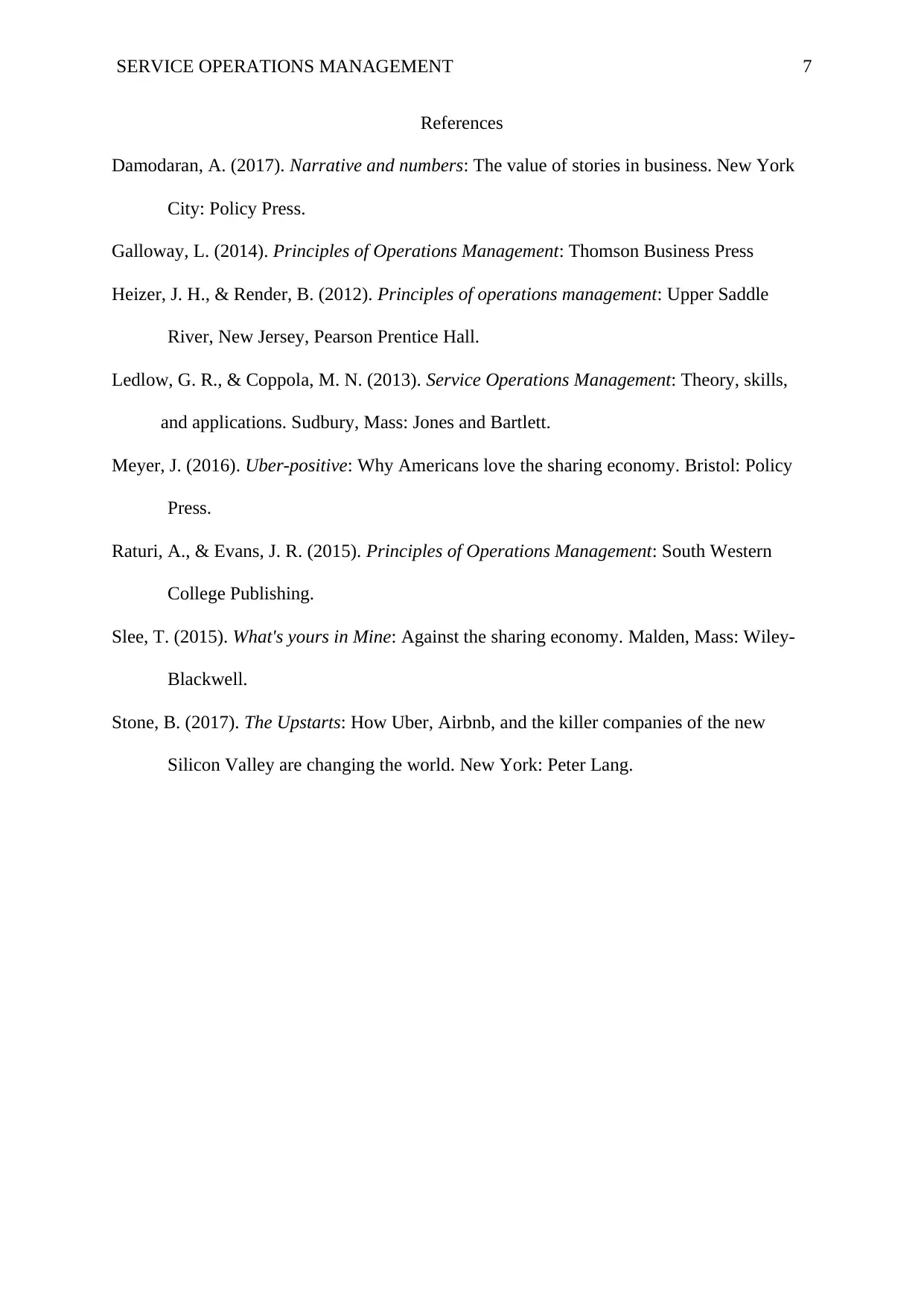
SERVICE OPERATIONS MANAGEMENT 7
References
Damodaran, A. (2017). Narrative and numbers: The value of stories in business. New York
City: Policy Press.
Galloway, L. (2014). Principles of Operations Management: Thomson Business Press
Heizer, J. H., & Render, B. (2012). Principles of operations management: Upper Saddle
River, New Jersey, Pearson Prentice Hall.
Ledlow, G. R., & Coppola, M. N. (2013). Service Operations Management: Theory, skills,
and applications. Sudbury, Mass: Jones and Bartlett.
Meyer, J. (2016). Uber-positive: Why Americans love the sharing economy. Bristol: Policy
Press.
Raturi, A., & Evans, J. R. (2015). Principles of Operations Management: South Western
College Publishing.
Slee, T. (2015). What's yours in Mine: Against the sharing economy. Malden, Mass: Wiley-
Blackwell.
Stone, B. (2017). The Upstarts: How Uber, Airbnb, and the killer companies of the new
Silicon Valley are changing the world. New York: Peter Lang.
References
Damodaran, A. (2017). Narrative and numbers: The value of stories in business. New York
City: Policy Press.
Galloway, L. (2014). Principles of Operations Management: Thomson Business Press
Heizer, J. H., & Render, B. (2012). Principles of operations management: Upper Saddle
River, New Jersey, Pearson Prentice Hall.
Ledlow, G. R., & Coppola, M. N. (2013). Service Operations Management: Theory, skills,
and applications. Sudbury, Mass: Jones and Bartlett.
Meyer, J. (2016). Uber-positive: Why Americans love the sharing economy. Bristol: Policy
Press.
Raturi, A., & Evans, J. R. (2015). Principles of Operations Management: South Western
College Publishing.
Slee, T. (2015). What's yours in Mine: Against the sharing economy. Malden, Mass: Wiley-
Blackwell.
Stone, B. (2017). The Upstarts: How Uber, Airbnb, and the killer companies of the new
Silicon Valley are changing the world. New York: Peter Lang.
1 out of 7
Related Documents
Your All-in-One AI-Powered Toolkit for Academic Success.
+13062052269
info@desklib.com
Available 24*7 on WhatsApp / Email
![[object Object]](/_next/static/media/star-bottom.7253800d.svg)
Unlock your academic potential
Copyright © 2020–2026 A2Z Services. All Rights Reserved. Developed and managed by ZUCOL.



